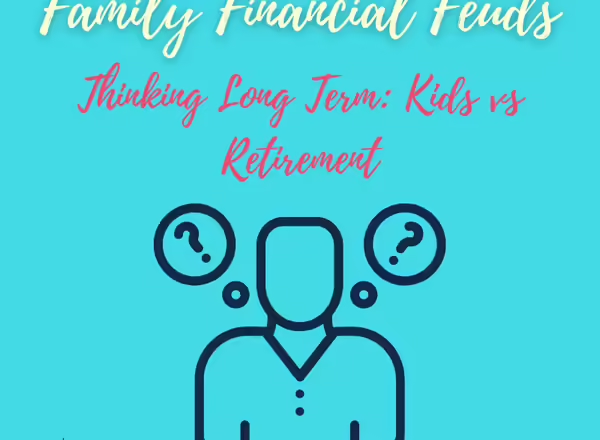
Should I pay extra on my student loan or invest in a Roth IRA? Build up an emergency savings fund or pay off my credit card debt? Pay off my mortgage or put more money in my 401(k) retirement plan? In one form or another, the trending question lately has been, "Is it better to pay down debt or build up savings and investments?"
Like many real-life questions, the answer is not black and white. The answer is likely to be based on both objective information as well as personal values. Here are two questions I suggest asking yourself: "How can you get the most out of your dollars and what's important to you?"
Best buy for your dollar.
First, how can you get the most out of your dollar? We tend to be on the lookout for the "best buy" for our dollar. We know that if we spend our dollar(s) on an item (such as a movie ticket) that that dollar will not be available to do something else (like buy dessert). The opportunity cost of the movie ticket is the loss of buying dessert. In this example, a dollar is worth a dollar because the choice is, "do I go to the movies tonight or buy dessert tonight?" Both options take place now.
However, it gets more complex when the choices have longer term impacts and the dollar we have now may change in value over time. For example, dollars used to buy mutual fund shares today may increase in value over time. For the sake of simple math, let's assume the mutual fund earns 10% over the next year. If you use $100 today to buy mutual fund shares, at the end of the year you would have $110. This is a $10 gain for your dollars.
But if you use your $100 to buy mutual fund shares, then you cannot use these dollars to do other things, like pay down credit card debt. Let's assume you have a $100 credit card balance with an annual percentage rate (APR) of 23%. If this credit card balance is not paid, at the end of the year you would owe $123. (Assume no minimum balance required and no fees to keep this example simple.) However, if you used your $100 to pay off the credit card balance, you will save $23 in interest. You have essentially earned a return on your money (gain) of $23 dollars.
When considering an investment with a return of 10% or paying off a debt with an APR of 23%, you get more from your dollar by paying down the debt. When trying to decide how to get the most from your dollar over time, first look at the interest rates charged compared to the possible return on investment.
Consider your tax status.
For some questions, the tax code makes this comparison more complicated. For example, if you have a mortgage on your home and you itemize deductions on your income taxes, the mortgage interest deduction reduces the amount of taxes you pay. Thus, a home mortgage loan at 5% interest may actually cost you less than 5%; the amount will depend on your tax bracket. You may also have a tax-advantage if you invest money in mutual fund through an employer-sponsored retirement plan such as a 401(k). If this applies to you, then your return on your dollars invested may be more than the increase in the value of the mutual fund. Keep in mind your tax situation when thinking about the opportunity costs of your dollar.
Financial values matter.
Next, ask yourself, "What's important to you?" Financial decision-making is more than adding up numbers. Our personal finances also are influenced by our values and personalities. Some people feel very strongly that they do not want to carry debt; this may influence their decision. Others value having emergency savings. A saving fund can provide financial security, and help avoid taking on new debt when unexpected expenses come up. Life and, to some extent, investing is unpredictable. People's comfort with life's unpredictability and their risk tolerance for the up-and-down of investment returns will also influence their financial decision-making. That's what makes the question of "what to do with my money?" both interesting and difficult.
When faced with a decision about what to do with your money, consider how you can get the most from your dollar. Also, think about your values and what is important to you. Challenge yourself to think about your long-term goals as well as your immediate needs. With thoughtful consideration, you can decide wisely how to use your dollars.
Originally posted on March 12, 2018.

In this Family Financial Feuds podcast episode, Sasha Grabenstetter, Kathy Sweedler, and Camaya Wallace Bechard feud about is it possible to save for your children's college while saving for retirement. We discuss our own past college paying experiences, define 529 education plans, and discuss it is okay to have multiple savings goals. Listen now.

Regardless of where you are in your student loan journey, there are many things to remember when managing those loans, from application to pay-off (or forgiveness). Learn the terms, tips, and tools to make managing your education debt easier. This webinar is a must for all who have student loan debt! April 3, 2024 at noon (CT), free and online. Register now for connecting information.

Kathy Sweedler provides personal finance online education with Illinois Extension. Kathy’s emphasis is to encourage people to be confident in their financial decisions, and to help them explore new ways of thinking about and managing money. When Kathy is not engaged in Extension work, she is often traveling and piecing together family genealogy. Genealogy is a puzzle, not that different from managing money!
Sign up for Illinois Extension’s Personal Finance E-Newsletter sent quarterly to receive updates about blog posts and events.